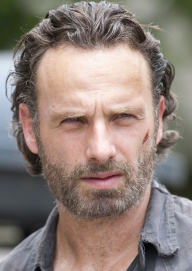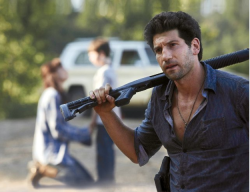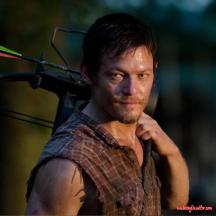Confession: I didn’t jump onto the whole “The Walking Dead” bandwagon until recently.
Next confession: It was a message series at church that got me on board. But maybe that should be their confession.
I was a slow adopter of TWD because it’s such a fad – I never watched it, but all I had to do was get on Facebook on a Sunday evening to know it was on. Plus, all the zombies sounded gross (and they are, but not enough to deter me).
The clips they showed during church were compelling. So I hopped onto Amazon and watched the first episode of season 1. And the next episode. And the episode after that.
I finished season 1 in a few days and quickly jumped into season 2. I’m about ten episodes into that, and I am completely hooked. I watch one or two episodes every day.
I was quite surprised to realize the zombies aren’t the main hook of the series, at least for me. They fill only 10-15% of the show in a given episode. The addictive nature of the show, I think, comes from all the conflict among, between, and within the characters. Being a writer, I analyze why and how all this conflict works so well and strive to apply it to my own work. Being a blogger, I get to share my insights with you. Because without conflict, we have no stories.
I’ll illustrate how the show uses each type of literary conflict (man vs. man, man vs. self, man vs. nature, and let’s throw in man vs. society) using specific characters.
Spoiler alert – if you’re a late adopter like me and plan to watch the series at some point, I’ll be including details from seasons 1 and 2. All photos came from walkingdead.wikia.com.
 Man vs. Man – Rick
Man vs. Man – Rick
He’s the MC, the guy in charge, also a “late adopter” into living with zombies, if you will. Because he’s the leader, he experiences the most Man vs. Man conflict.
It’s the most direct and easiest to define and use type of conflict. It’s protagonist vs. antagonist. The protag wants something, and the antag gets in the way. The protag must do something about the antag to reach his goal.
Rick experiences conflict with pretty much every other character. Shane wants his wife. Lori is his wife. Carl wants to grow up too quickly. Dale just wants to keep the group civil and his stuff accounted for. Rick has some intrapersonal conflict, but not as much as our next guy.
 Man vs. Self – Shane
Man vs. Self – Shane
Shane is a fascinating character. He started out in season one being the “backup hero”. He filled in for Rick when everyone thought he was dead – including in his relationship with Lori. Once Rick ended up being alive, Shane had all the guilt of thinking Rick was dead (because he basically gave up on his friend) and then in the aftermath of the relationship. After the episode with Otis, it all went to hell for him. The scene where he shaves off his hair was an incredibly visual symbol of him shaving away his old self.
Viewers want to think of Shane as a bad guy after that. He’s a murderer, for crying out loud. But even with that in his and in all of our heads, he still has moments of nobility. He wants to protect Lori and Carl. He wants to do what’s best for the group, even if it makes him look like an ass. I’m currently waiting for a tipping point to see which way he’ll go.
Update: I finished season 2 the day after I posted this. So…yeah. Gonna have to find a new Man vs. Self example. Dangit.
 Man vs. Nature – Daryl
Man vs. Nature – Daryl
In a way, all of the characters display Man vs. Nature, because they all have to fight off the zombies, who are more animal than human. But Daryl is the hunter. He has the ingrained know-how that keeps the group alive in more than one instance.
Daryl knows how to quickly find food and shelter. He took charge when Sophia was lost in the woods because he knows how to track. He had to bind his own wound. During one of the episodes when they were still looking for Sophia, he told a story of how he survived in the woods for nine days when he was a kid. He’s a badass guy.
 Man vs. Society – Andrea
Man vs. Society – Andrea
This is the “fight the powers that be” conflict. Andrea stands up to anyone in authority pretty much from the beginning. This lends itself to a lot of Man vs. Man conflict – I could have easily put her in that category. It’s the motivation that separates Man vs. Man and Man vs. Society.
Even in this “society-less” world, there are rules. Most of them exist to avoid attracting zombies, but there are rules about how to kill the zombies themselves. Andrea’s first rebellion (that I can remember) occurred when Amy died. Amy had been bitten, so they all knew she would become a walker. The only way to keep that from happening is to shoot the victim in the head. But as Amy’s sister, Andrea refused to leave her side. It wasn’t until Amy “came back to life” as a walker that Andrea did what she needed to do (resulting in a bunch of Man vs. Self conflict for her as well).
Her most frequent conflicts in the first two seasons (at least until episode 10 in season 2) are with Dale. Dale has assumed a kind of fatherly role for Andrea, and she doesn’t like it. She doesn’t assume the “female” chores of laundry and cooking like the other women do, a point of contention with Lori and Carol.
So what does all this teach us about conflict in our stories?
The Walking Dead does three things that make all this work:
1.It includes all types of conflict.
Not only are they all there, they are layered and clash with each other. Shane’s inner conflict plays well with Andrea’s societal conflict, but Rick doesn’t have much use for Shane playing the hero. Daryl’s personality doesn’t play well with others, but he has his soft moments, suggesting intrapersonal conflict for him too.
2. It weaves all types throughout the story, giving each its turn.
We have a scene of Rick and Shane fighting followed by Andrea seeing a walker while she’s on the RV followed by Daryl falling off a horse and landing in a creek. One type of conflict isn’t on screen long, so the show doesn’t have a chance to get boring.
3. It doesn’t depend on one type to tell the story.
Each conflict can move the story forward, and external plot points (like Carl getting shot) are tools for showing each type. Sure, the whole show could be driven by Shane’s instability, or by Rick’s focus on mission, but that wouldn’t be nearly as interesting.
Obviously, the types of conflict you use and how frequently you use them depends on your story. But if you find yourself leaning heavily on one type, see if you can weave in some of the others. This is what I plan to do, and if all goes according to plan, my stories will be more engaging.
What kinds of conflict do you write most often? What types would you like to use more?


Pingback: Story Stuff: C Is For Conflict | Allison Maruska
Pingback: Seven Ways To Add Conflict To Your Story (And How The Walking Dead Uses All Seven In A Single Episode) | Allison Maruska
I got into The Walking Dead last year. We had watched a few episodes before that, but turned it off because of a couple HUGE plot holes (or at least, they were huge to me and my hubbie). We gave it another try though, and we’re glad we did.
The show has definitely influenced my writing. The characters are deep, there is symbolism everywhere, and I love how every scenario, no matter how awful, leads to something worse. That’s the angle I’m trying to take on my WIP right now 🙂
Shows like that, like The Walking Dead, Game of Thrones, and Breaking Bad, where the writing is just so good, have been a real pleasure to watch since I started taking my writing more seriously. They serve as a crash course in dialogue and tension.
LikeLiked by 1 person
I’ve been holding out on Breaking Bad too, mainly for the same reason I held out on TWD. Maybe that’ll be next on the list.
Great point about the bad stuff leading to worse stuff. And yet there are those “breather” scenes, like when things are super awful for Rick somewhere, a few miles away Glenn is working it with the farm girl. If it was all super intense all the time, I might pass out.
LikeLiked by 1 person
Lol. When things get to tense I usually find something to distract myself in my phone. I like the way TWD intersperses scenes with sequels, but when they spend whole episodes on sequels, I get a little antsy.
LikeLiked by 1 person
I think I told you guys my brother raved about TWD when we were in Ohio 2 years ago. He was psyched to watch the latest episode and was basically trying to let me know it was recorded and set to go – like, assuming I was a fan and would either happily re-watch the episode or be happy to watch the episode I’d obviously missed driving 2 days to his house (cos I have a wife and a then three year old).
I went to bed early that night.
I couldn’t get into it. He even went as far as explaining it was about the choices and conflicts, as explained here, but I was odd man out. I tried twice to watch the opener but it just looked boring to me. No, it WAS boring. I will probably try to binge watch it one day but only because I have a hard time believing so much of America (and Canada, I guess, Jenny) is wrong and I’m right about a TV show.
I watched Breaking Bad and somehow missed a WHOLE SEASON and didn’t really miss it, the one before the finale season, so you have to wonder how good was it if you can miss all that? I was a regular watcher, too.
Game Of Thrones, at this point I can take it or leave it. I loved the show but this taking a year off between episodes SUCKS and the last season didn’t do it for me.
There are shows that are must see TV, but when you take a year off, you’re telling me it isn’t must see.
Most TV series like these start good and then flounder in year two or three, but they’re so popular they stretch it two more years. Or maybe it’s because I have a 5 year old now and zombies, drug dealers, and naked people whoring it up aren’t on the “must see” list until she goes to bed, and by then I fall asleep watching the first half of whatever is on.
More like must sleep TV. But I’m current on Gravity Falls, Alvin and The Chipmunks, and Star Versus The Forces Of Evil, a couple of Disney Channel & Nickelodean faves.
LikeLike
Ugh, I’m so thankful my kids never got into Disney or Nick shows. Spongebob had a brief run.
I’m starting season 3 tomorrow. After two years of watching almost no TV, I’m making up for lost time. Ha.
LikeLike
This show obviously gets under peoples skin because last week a blog I read was cracking on about it!
I think it is on over here in the UK but I have never watched it.
Maybe I might be missing out a little….
LikeLike
I’ve held out on all the “fad” shows just because they’re fads. Turns out this one is popular for a good reason. 😉
LikeLiked by 1 person
I shall check it out!
LikeLike
Great post Allison.
I reckon I use the Man vs Self type conflict in most of my writing. I suppose that’s not really a surprise as I generally write psychological thrillers so there’ll always be an element of inner conflict there.
I kind of touched on Man Vs Nature in a short story once, but even then it was more of a get-the-person-lost-so-that-they-can-potentially-be-murdered type thing…!
Oh, and I agree with Jim above – no spoilers don’t worry! – that as things progress with the Walking Dead it’s the various non-zombie conflicts that keep things interesting.
(You’ve got some HUGE cliffhangers and edge-of-the-seat stuff coming up by the way…!)
LikeLiked by 1 person
Yes, I suspect Man vs. Self would be your happy place. 🙂 Now that I’ve quit my day job, I plan to tackle my reading list, and your book is on it. It’s been very patient waiting for me. You should be proud.
That show knows how to work the cliffhangers, that’s for sure!
LikeLiked by 1 person
I think all that conflict is why I love the show. Andrea was my favorite in the early seasons. She grew so much through conflict. I think she could easily go into the Man v Self role as well. She needed to prove herself so badly, to break out of the role she felt trapped in, that she ended up shooting Daryl in the head.
As the series progresses (no spoilers, don’t worry) the zombies become even less of a factor as the group learns how to handle them. It’s the conflicts that keep the show vibrant.
I might have to go back and watch those old seasons again.
LikeLiked by 1 person
I was holding my breath hoping for lack of spoilers! LOL.
The last episode I watched today was the last with Dale. I’m curious to see what Andrea does now.
LikeLiked by 1 person
Just keep letting me know where you are and I’ll keep check on the spoilers! 😉
I remember watching that episode and thinking “The moral center is gone. The group is doomed.”
Think about the negative space that Dale left as you watch the next several episodes.
LikeLiked by 1 person
I had the same thought about them losing the moral center. The writers were smart to precede that with the Randal situation.
LikeLiked by 1 person